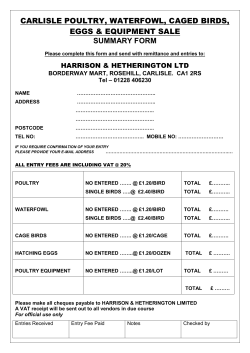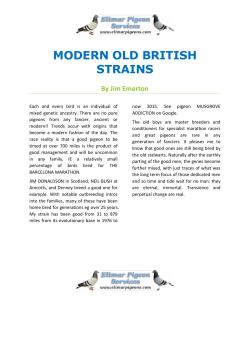
Industry Advisory - Canadian Pigeon Fanciers Association
Industry Advisory Animal Health and Welfare Branch Ontario Ministry of Agriculture, Food and Rural Affairs Biosecurity Advisory April 24, 2015 Avian Influenza Advisory for Pigeon Fanciers and Pigeon Racing Groups As of April 24, 2015, the Canadian Food Inspection Agency (CFIA) has confirmed the presence of a highly pathogenic H5N2 avian influenza virus (HPAI) on three commercial poultry farms in Oxford Country Ontario. This virus has been spreading across North America along the migratory pathways of wild waterfowl, so the risk is not confined to Oxford County. Avian influenza (AI) can infect domesticated and wild birds, including chickens, turkeys, pheasants, quail, ducks, geese, pigeons and guinea fowl. HPAI can cause severe illness and death in domestic birds. Birds become infected when they have direct contact with the secretions or feces of infected birds, or with contaminated surfaces or infected food and water supplies. Although pigeons are susceptible to infection with avian influenza, they are not generally effective at spreading the virus. However, fanciers should be aware of the possibility that pigeons can transfer the virus mechanically from their feet or feathers. Since HPAI can remain viable for long periods at low environmental temperatures, this is a very real scenario. In addition, under the trade conventions in place with our trade partners, pigeons are defined as poultry. Since the control zones currently in place in Ontario are for the control of poultry, it is necessary to quarantine known premises with pigeons. Within the Avian Influenza Control Zones, there is no movement of poultry allowed, unless with a licence issued by the CFIA. For additional information, please contact your local CFIA district office. At this time, pigeon fanciers are being strongly advised to take the following precautions: Do NOT attend shows, sales, and swap meets. Do NOT allow people who have recently been in contact with other birds (e.g., their own or attending a bird sale or show) near your birds. Do NOT share equipment with other bird owners. Do NOT add new birds to your flock until the outbreak has ended, since this is the number one means of bringing in disease. Do NOT race pigeons. “Small flock owners, including pigeon fanciers, have an important role to play in minimizing the spread of HPAI. If the virus continues to spread within Ontario, the consequences to Ontario poultry owners could be severe, in terms of reduced markets for birds, eggs, poultry products and genetics.” (Dr. Greg Douglas, Chief Veterinarian for Ontario) Be extremely diligent in observing your birds. Monitor mortalities and track feed and water consumption. Watch for any signs of disease, such as depression, decreased feed consumption, sneezing, gasping, a discharge from the nose or eyes, diarrhea or sudden death. Early detection is critical. Should you suspect any signs of health concerns in your flock, contact your veterinarian immediately, or call the CFIA Avian Influenza Diagnostic and Surveillance number: 519-691-0615. Additional information is available at: http://www.omafra.gov.on.ca/english/livestock/poultry/smallflock.html http://www.omafra.gov.on.ca/english/livestock/poultry/facts/12-039.pdf http://www.omafra.gov.on.ca/english/crops/organic/news/2015/2015-02a2.htm http://inspection.gc.ca/animals/terrestrial-animals/diseases/bird-healthbasics/eng/1323643634523/1323644740109 Agricultural Information Contact Centre: 1-877-424-1300 E-mail: ag.info.omafra@ontario.ca www.ontario.ca/omafra
© Copyright 2025









